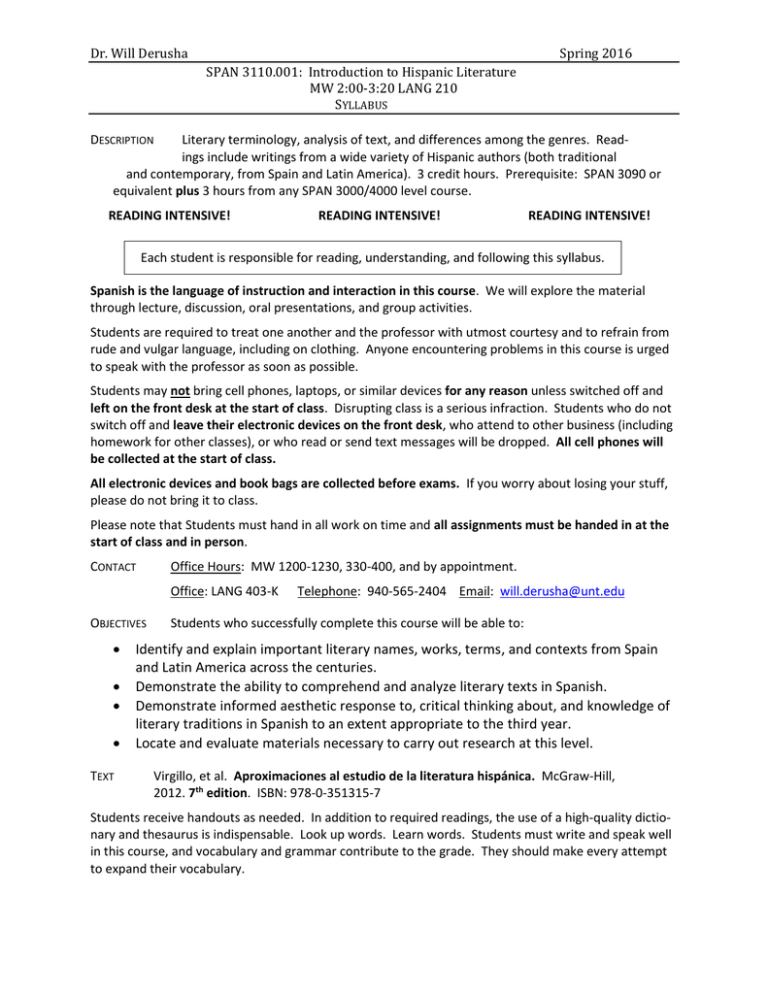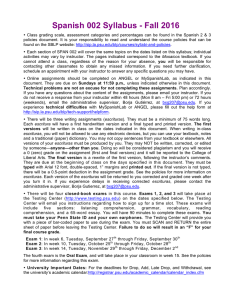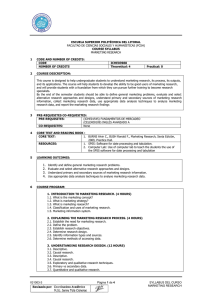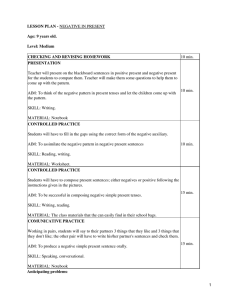• Identify and explain important literary names, works, terms, and
Anuncio

Dr. Will Derusha Spring 2016 SPAN 3110.001: Introduction to Hispanic Literature MW 2:00-3:20 LANG 210 SYLLABUS DESCRIPTION Literary terminology, analysis of text, and differences among the genres. Readings include writings from a wide variety of Hispanic authors (both traditional and contemporary, from Spain and Latin America). 3 credit hours. Prerequisite: SPAN 3090 or equivalent plus 3 hours from any SPAN 3000/4000 level course. READING INTENSIVE! READING INTENSIVE! READING INTENSIVE! Each student is responsible for reading, understanding, and following this syllabus. Spanish is the language of instruction and interaction in this course. We will explore the material through lecture, discussion, oral presentations, and group activities. Students are required to treat one another and the professor with utmost courtesy and to refrain from rude and vulgar language, including on clothing. Anyone encountering problems in this course is urged to speak with the professor as soon as possible. Students may not bring cell phones, laptops, or similar devices for any reason unless switched off and left on the front desk at the start of class. Disrupting class is a serious infraction. Students who do not switch off and leave their electronic devices on the front desk, who attend to other business (including homework for other classes), or who read or send text messages will be dropped. All cell phones will be collected at the start of class. All electronic devices and book bags are collected before exams. If you worry about losing your stuff, please do not bring it to class. Please note that Students must hand in all work on time and all assignments must be handed in at the start of class and in person. CONTACT Office Hours: MW 1200-1230, 330-400, and by appointment. Office: LANG 403-K OBJECTIVES TEXT Telephone: 940-565-2404 Email: will.derusha@unt.edu Students who successfully complete this course will be able to: Identify and explain important literary names, works, terms, and contexts from Spain and Latin America across the centuries. Demonstrate the ability to comprehend and analyze literary texts in Spanish. Demonstrate informed aesthetic response to, critical thinking about, and knowledge of literary traditions in Spanish to an extent appropriate to the third year. Locate and evaluate materials necessary to carry out research at this level. Virgillo, et al. Aproximaciones al estudio de la literatura hispánica. McGraw-Hill, 2012. 7th edition. ISBN: 978-0-351315-7 Students receive handouts as needed. In addition to required readings, the use of a high-quality dictionary and thesaurus is indispensable. Look up words. Learn words. Students must write and speak well in this course, and vocabulary and grammar contribute to the grade. They should make every attempt to expand their vocabulary. Derusha: SPAN 3110 Syllabus The UNT library links to many databases with full-text articles from scholarly journals, and you should avail yourself of this rich resource rather than plunge blindly into a Google search of dubious value. Except for such scholarly database articles, you may not depend on Internet sources in your research. For written work the use of Spell Check and Grammar Check programs is obligatory. Students must follow MLA format in all written work, as set forth on the course Blackboard page. All graded assignments must be complete, free of errors, the student’s own work, and done according to guidelines. Assignments of more than 1 page must be stapled. STAPLE! STAPLE! STAPLE! STAPLE! STAPLE! The final research-analytical paper must be uploaded through Turnitin, in Blackboard. We will work on the final paper all semester. Students should meet with the professor to discuss the work before handing it in. A hard copy, as well as all ancillary materials (photocopies, etc.), must be brought to class on the date due in a clearly marked and esthetically pleasing folder. Use one side of the paper ONLY. Papers must be stapled. Students are responsible for the professional appearance of all their work. “The University of North Texas makes reasonable academic accommodation for students with disabilities. Students seeking accommodation must first register with the Office of Disability Accommodation (ODA) to verify their eligibility. If a disability is verified, the ODA will provide you with an accommodation letter to be delivered to faculty to begin a private discussion regarding your specific needs in a course. You may request accommodations at any time, however, ODA notices of accommodation should be provided as early as possible in the semester to avoid any delay in implementation. Note that students must obtain a new letter of accommodation for every semester and must meet with each faculty member prior to implementation in each class. Students are strongly encouraged to deliver letters of reasonable accommodation during faculty office hours or by appointment. Faculty members have the authority to ask students to discuss such letters during their designated office hours to protect the privacy of the student. For additional information see the Office of Disability Accommodation website at http://www.unt.edu/oda. You may also contact them by phone at 940.565.4323.” Student behavior that interferes with an instructor’s ability to conduct a class or with other students’ opportunity to learn is unacceptable and disruptive and will not be tolerated in any instructional forum at UNT. Students engaging in unacceptable behavior will be directed to leave the classroom and the instructor may refer the student to the Center for Student Rights and Responsibilities to consider whether the student’s conduct violated the Code of Student Conduct. The university’s expectations for student conduct apply to all instructional forums, including university and electronic classroom, labs, discussion groups, field trips, etc. The Code of Student Conduct can be found at www.unt.edu/csrr Attendance There is no penalty for absences and so no need of excused or unexcused absences. Do not be fooled, however. Each day students attend class, they earn up to 10 points in participation. Therefore students earn no point (0) for any absence, whatever the reason. Homework will only be accepted from students who attend the entire class period. A student arriving late or leaving early earns only 5 points at most. Students who leave for bathroom breaks, feeding a meter, etc., will earn only 5 points at most. If you arrive late, take the seat closest to the door. If you will arrive more than 10 minutes late, turn around and go do something else with your time. Do not disrupt the class by coming in more than 10 minutes late and making the professor ask you to leave. Be professional. 2 Derusha: SPAN 3110 Syllabus If for any reason the professor does not show up within the first 10 minutes, please circulate a paper with attending students’ names clearly printed and clearly signed. One student should be responsible for circulating the paper and handing it in at the Main Office, LANG 101 on the way out. Those in attendance will receive full credit, provided the paper is handed in and time stamped before 2:20. A student with seven or more absences—for any reason—receives a D if ALL coursework has earned a passing grade; if not, an F will be assigned. GRADING The final grade is based on the following percentages: 15 % Students must actively participate in every class and clearly demonstrate by such participation that they have adequately prepared all material including vocabulary. Students earn nothing for absences or lackluster participation. Short homework and research assignments will be given. In any group work a collective grade is given to all who participate. 15 % There is a final formal presentation* at the end of the semester on the same text on which students write their investigation/analysis paper. Grade will be based on the quality of information and investigation, analysis and comprehension, fluency of expression, pronunciation and enunciation, grammar, and mastery of pertinent vocabulary. Students are not allowed to memorize or read from a prepared script. At the start of class they will distribute a handout of key information in outline form (one page). At the end of the presentation they will respond to questions and comments from the class. Students who do not present at the assigned time will receive a zero. 30 % There will be two exams (15% each). No make-ups or early exams are allowed. 20 % There will be a cumulative final exam. No make-ups or early exams are allowed. Students with three or more exams scheduled on the same day may be allowed to take the exam on a later date only with written permission from the Dean. 20 % Students will write one investigation/analysis paper* (3 or more pages) on the same text on which they give their final oral presentation. Academic research is a requirement of this course. A minimum of 4 academic sources must be used and cited. Each step in the process will be graded. The final paper must conform to all guidelines and include an obras citadas page of all sources cited in MLA format. Spelling and grammar count, as well as depth of content and command of information. Take great care with spelling, grammar, and punctuation, as well as formatting. These must be professional papers or the professor will simply stop reading and assign a zero. Grade scale A 100-90 B 89-80 C 79-70 D 69-60 3 F 59-0 Derusha: SPAN 3110 Syllabus *Choosing a text for the final paper Students may read one of the texts in Aproximaciones that does not appear on the syllabus. In consultation with the professor, other short works may be acceptable if originally written in Spanish. Please note that if students read or have read a certain work for another course, it may NOT be used in this course also. Once a student chooses to make a presentation on a certain text, no other student may use it. Students who do not choose a work by February 17 will receive a zero on this assignment and will accordingly fail the course. Be absolutely sure to check out the text before you commit to it. After February 17 no changes are possible. PROVISIONAL CALENDAR WEEK 1 WED Introducción al curso. ¿Qué es la literatura? Los géneros literarios. ¿Cómo narrar? Arco narrativo. Elementos de la narrativa. El cuento: Guía general para el lector. Tarea para hoy: Aproximaciones [AP], 2-19, 41, 76-77. «El paraíso imperfecto». «La rana que quería ser una rana auténtica». Blackboard: «Crueldad de Cervantes». WEEK 2 MON AP 73-74. «El hombre que aprendió a ladrar». «El otro yo». WED AP 46-50. «La camisa de Margarita». WEEK 3 MON AP 50-53. «Las medias rojas». WED Blackboard: «Génesis». WEEK 4 MON AP 79-83. «Pecado de omisión». WED Blackboard: «El árbol de oro». WEEK 5 MON La novela: Guía para el lector. AP 41, 110-117 (línea 258). San Manuel Bueno, mártir. WED AP 41, 117-124 (línea 529). Entregar el título, el autor y la fotocopia del texto para presentar y analizar a fines del curso. Consúltense las normas en Blackboard. 4 Derusha: SPAN 3110 Syllabus WEEK 6 MON AP 41, 124-135. El Cuestionario y las identificaciones (134-135). Repaso. WED Examen 1. WEEK 7 MON La poesía: Guía para el lector. AP 138-145, 200-201. «Si ves un monte de espumas». Blackboard: Versos sencillos. WED Cuatro sonetos. AP 176-178. (1) «Soneto XXIII». WEEK 8 MON Cuatro sonetos. AP 184-185, 190-191. (2) «Soneto CLXVI». (3) «A su retrato». WED Cuatro sonetos. Blackboard: (4) «Los fusilamientos de Moncloa». Entregar la tesis del trabajo final. WEEK 9 MARCH 14-20 SPRING BREAK – NO CLASSES WEEK 10 MON AP 198-200. «Rima XI». «Rima LIII». WED Blackboard: «Sonatina», «Lo fatal» WEEK 11 MARCH 30, APRIL 1 MON Tres romances. AP 174-175, 211-212, 223-224. «El enamorado y la muerte». «Proverbios y cantares XXIX». «Canción del jinete». WED Examen 2. Entregar el primer párrafo y la bibliografía provisional del trabajo final. WEEK 12 APRIL 6, 8 MON AP 290-291, 335-347. La casa de Bernarda Alba. Acto 1. WED AP 348-360. La casa de Bernarda Alba. Acto 2. 5 Derusha: SPAN 3110 Syllabus WEEK 13 APRIL 13, 15 MON AP 360-371. La casa de Bernarda Alba. Acto 3. WED Consultar con el profesor sobre el trabajo final. WEEK 14 APRIL 20, 22 MON Presentación. WED Presentación. WEEK 15 APRIL 27, 29 MON Presentación. WED Presentación. WEEK 16 MAY 4, 6 MON Últimas presentaciones, si son necesarias. Subir el escrito analítico al Turnitin. Entregar la copia dura, junto con la documentación, en clase. WED Últimas consideraciones. Repaso. WEEK 17 MAY 11 MON Examen final, 1:30-3:30. 6




